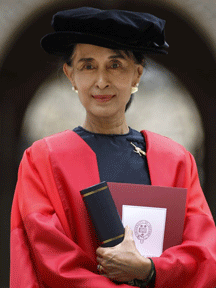By Su Myint
Amidst Burma’s political corruption, economic stagnation, and infrastructural deterioration that riddled the country for the past five decades under repressive military rule, the crumbling education system served as one glimmer of hope for the betterment of its people. Universities were at the center of independence movements as far back as colonial rule, and in more recent history, these institutions of higher education were at the heart of pro-democracy movements against dictatorial reign. The bright, young intellectuals of Burma understood that justice was not a privilege, but a right that should be blind to social class demographics and governmental affiliations.
When the military reconsolidated its firm grip on Burma after the 8888 Uprising, students were amongst the first targets of political imprisonment, extrajudicial killings, and countless other human rights atrocities. The Executive Director of the United States Campaign for Burma in Washington, D.C., Aung Din, was one of numerous political prisoners after he led the All Burma Federation of Student Unions, the largest national organization of student activists. The military regime shut down universities immediately after the 8888 Uprising for much of the 1990s in order to prevent student activists from reassembling. The capacity to think critically, form independent judgments, and carry out the duties of citizenship underscore the value of a liberal arts education
As Burma begins its arduous path towards reconciliation and institutional reform today, the newly elected Member of Parliament, Chairwoman of the National League for Democracy (NLD), and former political prisoner, Aung San Suu Kyi, repeatedly stresses higher education as an underlying necessity for overcoming the obstacles that lie ahead in the country’s democratic reforms. After the historic April 2012 elections in which the NLD won a landslide victory (43 of the 44 contested seats), Suu Kyi was finally granted permission to leave Burma after being confined within its repressive borders for the past 24 years, most of which were spent in house arrest.
One of her first trips abroad was to the 101st International Labour Conference in Geneva on June 14 of this year. In response to the practical question of priorities for reform raised at the conference, Suu Kyi highlighted university education as a fundamental element in solving the issues of unemployment and job creation. Education reform with an emphasis on liberal arts and sciences is integral to equipping Burmese youth with the necessary tools to face the responsibilities of citizenship that lie ahead in this crucial phase of the nation’s history. Suu Kyi alluded to a particularly important consequence of revamping Burma’s educational institutions. She proclaimed, “it is not so much joblessness as hopelessness that threatens our future.” In a society that has failed to provide its youth with a chance to realize their potential as critical actors in their communities, young people drift aimlessly, often falling prey to a life of crime and drug abuse as they struggle with the futility and lack of purpose of their existence. Job creation and employment are chief byproducts of meaningful education under the right conditions, but the intangible effects of higher education
Top left: Aung San Suu Kyi, receiving an honorary degree from Oxford University, June 2012.




